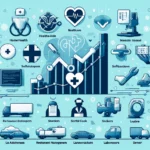The job market is changing fast, thanks to emerging technologies. These advancements are shaking up every industry, creating a dynamic environment where the nature of jobs, the skills needed, and workplace cultures are evolving. To succeed in this new landscape, it’s important to understand and adapt to these changes.
Key Points
- Technological advancements are creating new career opportunities and transforming existing jobs.
- Continuous learning and skill development are essential to thrive in the evolving job market.
- Adapting to technological changes is crucial for career growth and future opportunities.
Technological Landscape and Future Projections
As we look ahead, it’s clear that technologies like artificial intelligence (AI), automation, robotics, and the Internet of Things (IoT) are reshaping our professional lives. These aren’t just buzzwords; they are the building blocks of the next industrial revolution.
Artificial Intelligence and Automation
AI is becoming a core part of our work environment, with automation getting more sophisticated every day. From healthcare to finance, AI is making processes more efficient. For example:
- Healthcare: AI helps diagnose diseases with greater accuracy.
- Finance: Algorithmic trading boosts efficiency and precision.
AI-powered virtual assistants can handle administrative tasks, freeing up professionals to focus on creative and strategic work.
Robotics and IoT
Robotics and IoT are revolutionizing workplaces by enabling tasks to be done more precisely and efficiently. Imagine:
- Robotic Surgeries: Robots perform surgeries with real-time data from IoT devices.
- Predictive Maintenance: IoT sensors in manufacturing prevent downtime by predicting equipment failures.
These technologies are enhancing productivity and safety, making them essential for future career development.
Transforming Nature of Work
The nature of work is changing rapidly, driven by technological advancements. This shift is creating new roles and requiring a fresh set of skills.
Emergence of New Job Roles
Technologies like AI and robotics are creating entirely new job roles. Some examples include:
- Data Analysts: Interpreting complex data to make informed decisions.
- AI Ethics Officers: Ensuring ethical standards in AI development.
- Sustainability Managers: Promoting eco-friendly practices in organizations.
Redefining Skills and Talent
Skills are shifting from a fixed set to an adaptable mindset. Key skills now include:
- Problem-Solving: Tackling complex issues creatively.
- Adaptability: Adjusting to new technologies and environments.
- Lifelong Learning: Continuously updating knowledge and skills.
Impact of Automation on Employment
Automation is reshaping industries, affecting both productivity and job markets.
Productivity and Job Losses
Automation boosts productivity by handling repetitive tasks efficiently. However, it can also lead to job losses in routine roles. For instance:
- Increased Efficiency: Tasks that took hours can now be done in minutes.
- Job Displacement: Many routine jobs are at risk as machines take over.
Shifts in Labour Markets
Automation is not just eliminating jobs; it’s creating new ones that require different skills. New roles are emerging in:
- Overseeing Automated Systems: Managing and maintaining advanced technologies.
- Human-Centric Jobs: Roles requiring critical thinking, creativity, and emotional intelligence.
Industry-Specific Changes
Emerging technologies are transforming various industries, especially healthcare and manufacturing.
Healthcare in the Digital Age
Technological advancements are revolutionizing healthcare:
- Predictive Tools: AI and machine learning help in diagnosing and predicting health issues.
- Electronic Health Records (EHRs): Streamlining data management for better patient care.
Manufacturing and 3D Printing
3D printing is changing manufacturing by:
- Accelerating Prototyping: Faster and more personalized production.
- Customisation: Producing unique parts on-demand, reducing inventory costs.
Role of Data and Big Data Analytics
Data is a key resource in the new technological landscape, shaping business strategies and operations.
Improving Business Decisions
Big data helps companies make better decisions by analyzing vast datasets to identify patterns and trends. For example, retailers use data to:
- Optimize Stock Levels: Predict consumer behavior to reduce waste and increase profits.
Ethical Considerations in Data Usage
With the power of big data comes the responsibility to use it ethically:
- Privacy Concerns: Companies must protect individual rights and comply with regulations like GDPR.
- Data Governance: Establishing policies to ensure ethical use of data.
Evolving Workplace Cultures
Workplace cultures are rapidly changing, emphasizing connectivity and work-life balance.
Flexible Work Practices
More companies are adopting flexible work practices:
- Remote Work: Employees can work from home or choose their hours, reducing stress and improving job satisfaction.
- Digital Platforms: Tools that enable effective communication and project management in a virtual environment.
The Rise of Digital Nomadism
Digital nomadism is becoming popular, allowing people to work from anywhere in the world. This lifestyle relies on:
- Effective Communication: Staying connected with teams remotely.
- Discipline and Time Management: Balancing work and travel efficiently.
The Human Element in a Technological Era
Even with advancing technologies, human capabilities and creativity remain crucial.
Safeguarding Human Capabilities
Ethics, emotional intelligence, and strategic decision-making are irreplaceable human traits. To preserve these:
- Continuous Education: Focusing on problem-solving, leadership, and social skills.
- Organizational Support: Investing in training and development opportunities.
Innovation through Human Creativity
Human creativity drives innovation. Encouraging creative thinking leads to breakthroughs and new applications of technology. For instance:
- Creative Applications: Finding new ways to use existing technology to solve problems.
- Diverse Perspectives: Bringing different viewpoints to fuel innovation.
Education and Skills Development
Education and skills development are key to preparing for future careers in a technology-driven world.
Addressing the Skills Gap
The skills gap between what workers have and what employers need is growing. To bridge this gap:
- Tailored Training Programs: Continuous professional development and apprenticeships.
- Business-Education Partnerships: Collaborations to equip the workforce with necessary skills.
STEM Education as a Foundation
STEM education (Science, Technology, Engineering, and Mathematics) is crucial for developing future professionals:
- Hands-On Projects: Engaging students with practical science and technology projects.
- Early Interest: Sparking a passion for STEM subjects at a young age.
Sustainability and Corporate Responsibility
Careers in emerging technologies will be shaped by sustainability and corporate responsibility.
Adopting Sustainable Practices
Technologies can help companies reduce their environmental impact. For example:
- Energy-Efficient Systems: Developing solutions to minimize energy consumption.
- Eco-Friendly Materials: Creating new materials that are sustainable.
Corporate Ethics in Technology Use
Ethics in technology is essential, considering:
- Data Privacy: Protecting personal information.
- Fair Employment Practices: Ensuring technology doesn’t widen inequalities.
Global Trends Influencing Work
Certain global trends are profoundly affecting employment landscapes and career opportunities.
Migration and the Global Talent Pool
Increased migration is diversifying the workforce and fueling technological growth. Skilled professionals moving across borders bring:
- Diverse Perspectives: Enhancing innovation.
- Increased Competition: Potentially driving up wages for in-demand skills.
Trade and Economic Dynamics
Trade agreements and economic policies influence job markets. For instance:
- Investment in Tech Industries: Creating new jobs and revitalizing existing ones.
- Regional Tech Hubs: Emerging in response to economic dynamics.
Conclusion
As the job market evolves, staying adaptable and continuously learning are vital. Embracing new technologies and developing relevant skills will open up exciting career opportunities. By understanding these trends and preparing for the future, you can navigate the changing landscape of work and thrive in your career.
Q&A
What skills will be essential for professionals navigating job markets in the face of new technologies?
- Adaptability and a continuous learning mindset are vital.
- Digital literacy combined with soft skills like problem-solving, creativity, and communication.
Which industries are predicted to offer the most job opportunities resulting from technological advancement by 2030?
- Renewable energy, information technology, and healthcare are expected to grow significantly.
How can individuals prepare for the changes in employment trends due to emerging technologies?
- Upskilling and reskilling through educational programs and workshops focusing on emerging tech skills.
In what ways might emerging technologies create a positive impact on job availability and employment rates?
- New job roles and enhanced productivity could lead to more job availability and robust employment rates.
What are the forecasts for the evolution of current job roles with the advancement of technology?
- Traditional roles may evolve to include managing and maintaining advanced technologies and analytical tools.
Can you identify some career paths that may emerge as a result of technological innovations in the upcoming years?
- Cybersecurity, data analytics, and software development are poised to expand.
- AI ethics and sustainable technology roles are also likely to emerge.
















